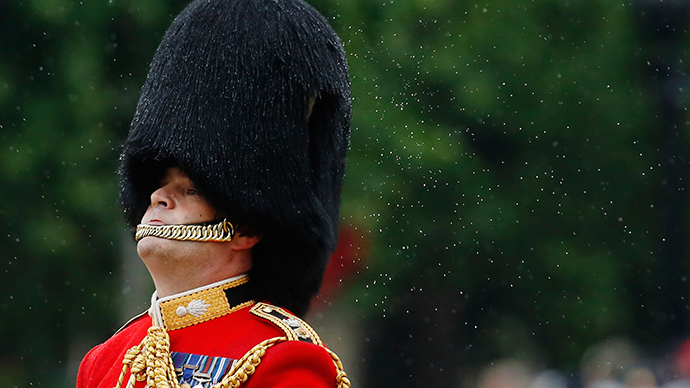‘Western destabilizing Mid-Eastern policy makes UK a target for terror threat’

The potential of Britain becoming a target for terrorist attacks comes as a consequence of the destabilization of the Arab world, and as a consequence of American, NATO and Western policy in the Middle East, political analyst Chris Bambery told RT.
The famous Royal guards in London that attract millions of tourists are now standing behind bars accompanied by armed police officers because of a possible terrorist attack. It shows the concerns over a possible ‘lone wolf’ attack are more than serious.
RT:Why do you think the Royal guards are a target? Why?
Chris Bambery: I suspect anything could be a target. The security forces, which they are part of, are obviously a target. I think the potential for Britain becoming a target of terrorist attacks is obvious. We participated with gusto, invasions both in Afghanistan and Iraq, the bombing campaign in Libya which overthrew the Gaddafi regime, and David Cameron’s government wanted to intervene in Syria but was stopped by the British Parliament. Therefore, its foreign policy record around the world is one that is backing up the US at every conceivable opportunity on waging war in Muslim countries. Our record in Palestine is the one that’s supporting Israel, and the latest war in Gaza of just a couple of months this summer. At home there has been a constant flow of Islamophobia from the media and from politicians, justifying the so-called ‘war on terror’. All of that creates what is called in the trade ‘a blowback’, which means that the individuals who have been alienated from British society, Muslims within this country, might turn to terrorism, which is what we saw in 2005 of course with the bombings in London, and we have seen in subsequent instances like the killing of Lee Rigby earlier this year. However, I also think we have to say that you are more likely to die of a domestic accident in Britain than in a terrorist attack. I think we need to get the terrorist threat posed here in perspective and also say where this is coming from. It’s coming as a consequence of British foreign policy.

RT:Moving the royal guards may be symbolic, but does it send a wider message that those threatening terror are getting their way, and spreading enough fear?
CB: I think it does in a sense and I’m quite surprised by this move. This is a real symbol - Changing the Guard at Buckingham Palace is a song that kids grow up with in this country, it’s in the package that tourists come to get themselves photographed with. Changing in this way does seem to me as giving in a little bit to this supposed threat. I would have thought that if you have been to Buckingham Palace, the level of security is fairly high anyway, it’s obviously fairly high, and it’s under very tight surveillance. There are more obvious targets such as the transport system…But the message from governments has always been ‘Don’t panic, carry on life as normal, don’t give in to terrorism’. And yet, at the Queen’s house we see precisely what has been taking place. I’m rather perplexed why they have done this and why they have done this in such a glare of publicity, unless there is of course some interest in building up the idea that Britain is going to be the next target of these terrorists around the globe.
RT:The UK’s Home Secretary has upgraded the level of threat from ‘substantial’ to ‘severe’. What message are they sending? Do you think there is a real threat?
CB: There could be a threat. I’ll give you one example why there could be a threat. Not so far from the shores of southern Europe, in Libya, Islamic State now has a training camp. They were able to do that because of the chaos which has been unleashed in Libya since the NATO intervention spearheaded by Britain and France. We have brought that country to complete chaos and we have allowed terrorist groups linked to al-Qaeda and Islamic State into that country, and indeed elsewhere in North Africa. That is within spitting distance of Europe’s borders and it obviously represents something of a threat. But the threat is there as a consequence of British and French action in carrying out that campaign against Libya. We have to look a bit beyond what the immediate threat is and say why this specter of terrorism has come to haunt us so much. And it comes as a consequence of a destabilization of so much the Arab and indeed Muslim world, as a consequence of American, NATO and Western policy.
The statements, views and opinions expressed in this column are solely those of the author and do not necessarily represent those of RT.
The statements, views and opinions expressed in this column are solely those of the author and do not necessarily represent those of RT.












